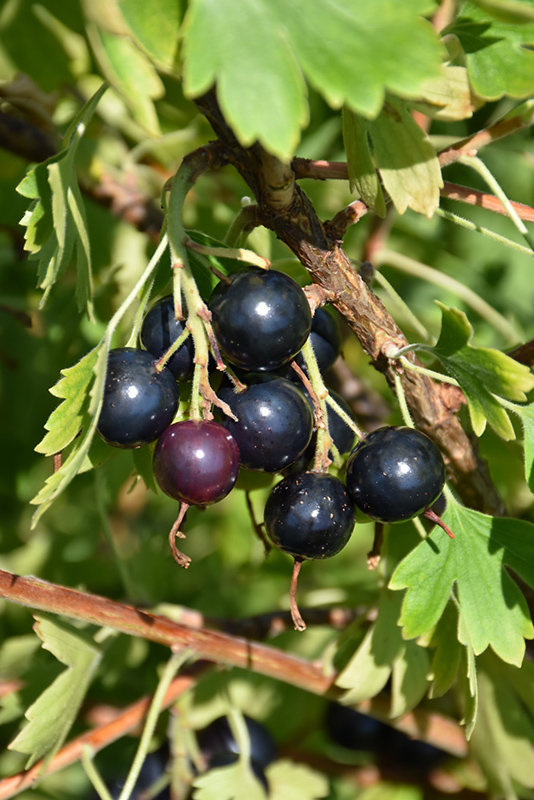Crandall Clove Currant Ribes odoratum 'Crandall' Height: 4 feet Spread: 5 feet
Sunlight:
Hardiness Zone: 3 Other Names: Blackcurrant, Buffalo Currant, Missouri Currant Description: An upright shrub with arching branches, features fragrant clove-scented yellow flowers in spring followed by large, tasty berries, good fall color; fine for a medium-sized hedge or screen, tends to sucker and open up with age, can be susceptible to mildew Edible Qualities Crandall Clove Currant is a small shrub that is commonly grown for its edible qualities, although it does have ornamental merits as well. It produces large clusters of black round berries with a silvery blue blush which are typically harvested when mature. The berries have a tart taste with a juicy texture and a sweet fragrance. The berries are most often used in the following ways: Features & Attributes Crandall Clove Currant has racemes of fragrant yellow tubular flowers hanging below the branches from mid spring to early summer before the leaves. It has green deciduous foliage. The lobed leaves turn an outstanding crimson in the fall. It features an abundance of magnificent black berries with silvery blue blush from mid summer to mid fall. This is a multi-stemmed deciduous shrub with an upright spreading habit of growth. Its relatively fine texture sets it apart from other landscape plants with less refined foliage. This plant will require occasional maintenance and upkeep, and should only be pruned after flowering to avoid removing any of the current season's flowers. It is a good choice for attracting butterflies and hummingbirds to your yard. Gardeners should be aware of the following characteristic(s) that may warrant special consideration; Aside from its primary use as an edible, Crandall Clove Currant is sutiable for the following landscape applications; Planting & Growing Crandall Clove Currant will grow to be about 4 feet tall at maturity, with a spread of 5 feet. It has a low canopy. It grows at a medium rate, and under ideal conditions can be expected to live for approximately 30 years. This is a self-pollinating variety, so it doesn't require a second plant nearby to set fruit. This shrub is quite ornamental as well as edible, and is as much at home in a landscape or flower garden as it is in a designated edibles garden. It does best in full sun to partial shade. It is very adaptable to both dry and moist locations, and should do just fine under average home landscape conditions. It is considered to be drought-tolerant, and thus makes an ideal choice for xeriscaping or the moisture-conserving landscape. This plant will benefit from an application of bonemeal and/or mycorrhizal fertilizer at the time of planting. It is not particular as to soil pH, but grows best in rich soils. It is highly tolerant of urban pollution and will even thrive in inner city environments. This is a selection of a native North American species, and it is considered by many to be an heirloom variety.![]()
![]()
![]()
![]()
![]()
![]()
![]()
![]()
![]()
![]()
![]()
![]()
![]()
![]()
![]()
Characteristics
Applications
Ornamental Features
This guide is an online resource representing many of the varieties that we carry over the course of the season, and is intended for informational purposes only. Inventory varies seasonally, so we cannot guarantee that every plant will be in stock at all times - please contact the store directly for current availability. It does not include our entire selection of plants, so be sure to visit our store to see varieties that may not be represented on this list.


